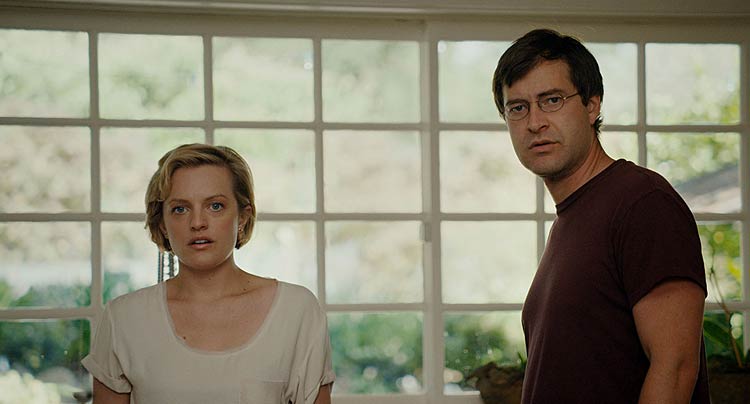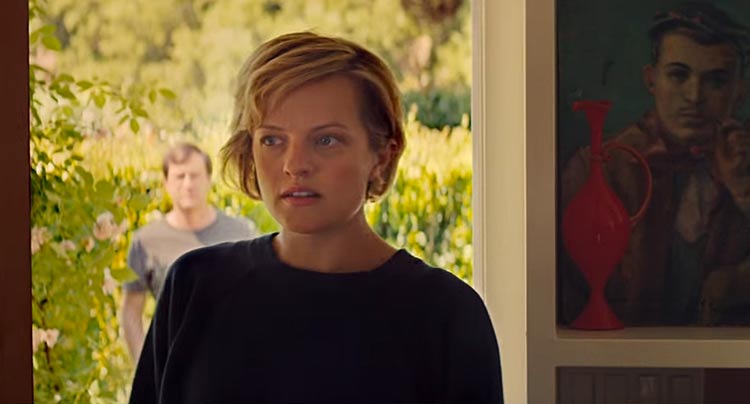
An innovative way to demonstrate how relationships tend to lose their spark over time.

An innovative way to demonstrate how relationships tend to lose their spark over time.
Let me first start out by saying that this review contains some spoilers found in The One I Love. Normally I believe spoilers shouldn’t be discussed in reviews, but in this case the “twist” is revealed almost immediately and it ends up being the main topic of the film–there wouldn’t be much to talk about without acknowledging it. Knowing this twist only takes some of the fun out of the discovery, but by no means doesn’t it ruin the experience. Having said all that, you’ve officially been warned.
In effort to save their troubled relationship Ethan (Mark Duplass) and Sophie (Elisabeth Moss) agree to go on “the perfect getaway” suggested to them by their therapist (Ted Danson). So the couple travel to a secluded vacation home for a relaxing weekend retreat. But the couple soon realize they’re getting way more than they bargained for. Not only do they discover the house has a neat little guest house, it’s what they find inside the guest house that completely baffles them.
Like something taken from a Twilight Zone episode, one of them enters the guest house to find an exact replica of the other partner. As expected, Ethan and Sophie are freaked out by this discovery at first. But once they realize that their doppelgangers are actually better versions of their partner—more charming, attractive, and fun to be around—the couple decide to spend time with their upgraded better half. Even with the proper ground rules this becomes a dangerous game because they end up falling in love with them.

Not only does The One I Love ask what qualities would you change in your partner, it also asks how you would change yourself. At one point Ethan admits that his doppelganger is about “20% cooler and 20% more emotionally involved” than he is. What’s more, he understands that he won’t ever be that perfect person. Accepting these imperfections in other people as well as yourself is the moral of the story.
The One I Love carefully avoids the trap of making sense of the metaphysics involved by telling its own characters not to question the “magic”. Ethan explains how an animal doesn’t question how electricity works, they simply embrace that lights magically turn on. The point isn’t how it works, so just roll with it. Essentially, it’s a subtle way to tell the audience not to nitpick at the logistics. Which is wise since the film leaves major questions unanswered like where did these doubles come from or how do they even exist?

Duplass and Moss do their best to portray better versions of themselves, changing their mannerisms significantly when playing their double. Sophie’s doppelganger uncharacteristically allows Ethan to eat bacon (the real Sophie would never allow for that!) and Ethan’s suddenly becomes interested in art. But unless they’re onscreen at the same time it can be difficult to visually tell which character they’re playing. Perhaps it was intentional to show only subtle alterations to their physical form, making them slightly more attractive to the other partner, but I’m not sure if it was completely necessary. The One I Love helps those who miss the tiny indicators by explicitly pointing out that Duplass looses his glasses and Moss pins her hair back when playing the doppelgangers.
The One I Love uses an innovative way to demonstrate how relationships tend to lose their spark over time. The film nearly paints itself into a corner by revealing its “twist” so early on, making the second act seem sluggish. It’s not that the story ever gets boring, but it shifts into cruise control for a while. However things start to come to live in the final act. A late film development makes it interesting again in time for a satisfying conclusion. The One I Love might not win over everyone, but Charlie McDowell demonstrates distinct talent as a young filmmaker in his feature debut.